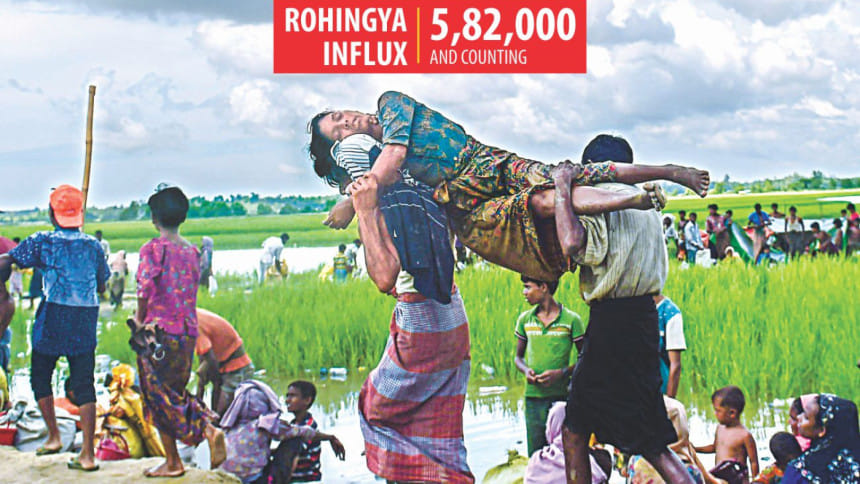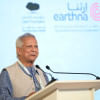Urgent need for fund, aid

Amid fresh waves of Rohingya influx, the UN has urged the international community to come together to support the October 23 pledging conference to meet the life-saving needs of the displaced Myanmar nationals and to promote their safe return home.
Three UN-led aid bodies have appealed for $434 million over six months (Sept 2017 to Feb 2018) to help up to 1.2 million people, including some 400,000 Rohingyas already in Bangladesh before the latest crisis began in late August.
But to date, available funding and uncommitted pledges amount to roughly $100 million, according to a document of the pledging conference.
Two neighbouring countries -- India and China who are among Myanmar's closest allies -- are not in the list of financial contribution.
Diplomatic sources in Dhaka told The Daily Star yesterday the UN needed to prepare a "massive" funding request to manage the Rohingya refugees sheltered in Bangladesh as the number was rising every day and there was no sign of any repatriation in near future.
The UN yesterday reported that an estimated 582,000 refugees have arrived in Bangladesh since violence erupted in Myanmar's northern Rakhine state on August 25.
Meanwhile, the UN refugee agency yesterday called on Bangladesh to speed up vetting of up to 15,000 Rohingya refugees "stranded" near the border after crossing into the country from Myanmar and move them further inland to safer and better conditions, reports Reuters.
Reports of the fresh influx comes as latest satellite images of the HRW show at least 288 villages have been partially or fully destroyed by fire in Rakhine since August 25. At least 66 villages were burned after September 5, when security force operations supposedly ended.
The pledging conference would be held in Geneva on Monday to "send a strong message to Rohingya refugees and their generous hosts in Bangladesh that the world is there for them in their greatest time of need," said a statement by the heads of three UN aid bodies -- UN High Commissioner for Refugees (UNHCR) Filippo Grandi, Undersecretary-General for Humanitarian Affairs and Emergency Relief Coordinator (OCHA) Mark Lowcock and Director-General of the International Organisation for Migration (OIM) William Lacy Swing.
The ministerial-level pledging conference will be co-hosted by the European Union and the government of Kuwait, and co-organised by the UNHCR, IOM and OCHA.
The four objectives of the conference is to mobilise urgent resources to provide life-saving humanitarian aid; demonstrate solidarity with Bangladesh; promote all international and humanitarian laws for the refugees; and to promote safe, voluntary and sustainable return of the refugees to the place of origin, the statement said.
"We call on the international community to intensify efforts to bring a peaceful solution to the plight of the Rohingya, to end the desperate exodus, to support host communities and ensure the conditions that will allow for refugees' eventual voluntary return in safety and dignity," it added.
The speed and the scale of the influx made it "the world's fastest growing refugee crisis and a major humanitarian emergency," the joint statement noted. "The origins and, thus, the solutions to this crisis lie in Myanmar."
According to UN and government officials, the flow is the largest refugee movement in the region in decades and brings the total number of Rohingya living in Cox's Bazar to over one million with the numbers still growing.
"We have been moved by the welcome and generosity shown by the local communities towards the refugees," the joint statement said, while noting their respective agencies have been working in overdrive with the Bangladesh government, local charities, volunteers and nongovernment organisations to provide assistance.
"The efforts must be scaled up and expanded to receive and protect refugees and ensure they are provided with basic shelter and acceptable living conditions," the statement said adding, "Every day more vulnerable people arrive with very little, if anything, and settle either in overcrowded existing camps or extremely congested makeshift sites."
'EVERY MINUTE COUNTS'
The UN refugee agency is concerned about the humanitarian condition of thousands of new arrivals who are stranded near the Bangladesh-Myanmar border.
UNHCR Spokesperson Andrej Mahecic yesterday told reporters in Geneva that an estimated 10,000 to 15,000 Rohingya refugees have entered Bangladesh through the Anjuman Para border crossing point in Ukhia since Sunday night.
As of yesterday morning, they were still squatting in the paddy fields of Anjuman Para village in Bangladesh.
They are waiting for permission from Bangladesh authorities to move away from the border, where the sound of gunfire continues to be heard every night from the Myanmar side.
The UNHCR has urged the Bangladesh authorities to urgently admit these refugees fleeing violence and increasingly-difficult conditions back home.
"Every minute counts given the fragile condition they're arriving in," Reuters quoted the spokesperson as saying.
The delay was due to screening by Bangladesh border guards, he said, emphasising this was the right of any government.
He said the UNHCR and its partners, Bangladesh Red Crescent and Action against Hunger, are delivering food and water to the stranded refugees, among them children, women and the elderly who are dehydrated and hungry from the long journey.
"Many say they had initially chosen to remain in their homes in Myanmar's northern Rakhine state despite repeated threats to leave or be killed. They finally fled when their villages were set on fire," Andrej Mahecic said.
MASS DESTRUCTION
Releasing the latest satellite images, the Human Rights Watch yesterday said its analysis indicated that the burnings focused on Rohingya villages and many of those took place after Burmese officials claimed that their "clearance operations" had ceased.
The imagery pinpoints multiple areas where destroyed Rohingya villages sat adjacent to intact ethnic Rakhine villages.
"These latest satellite images show why over half a million Rohingya fled to Bangladesh in just four weeks," said Phil Robertson, deputy Asia director.
"The Burmese military destroyed hundreds of Rohingya villages while committing killings, rapes, and other crimes against humanity that forced Rohingya to flee for their lives."
A total of 866 villages in Maungdaw, Rathedaung and Buthidaung in Rakhine were monitored and analysed by the HRW.
Most of the damage occurred in Maungdaw Township, accounting for about 90 percent of the areas where destruction happened between August 25 and September 25.
Comparing recent imagery with those taken prior to the date of the attacks, analysis showed that most of the damaged villages were 90 to 100 percent destroyed.
Many villages which had both Rohingya and Rakhine residing in segregated communities, such as Inn Din and Ywet Hnyo Taung, suffered heavy arson damage from arson attacks, with known Rohingya areas burned to the ground while known Rakhine areas were left intact.

 For all latest news, follow The Daily Star's Google News channel.
For all latest news, follow The Daily Star's Google News channel. 







Comments